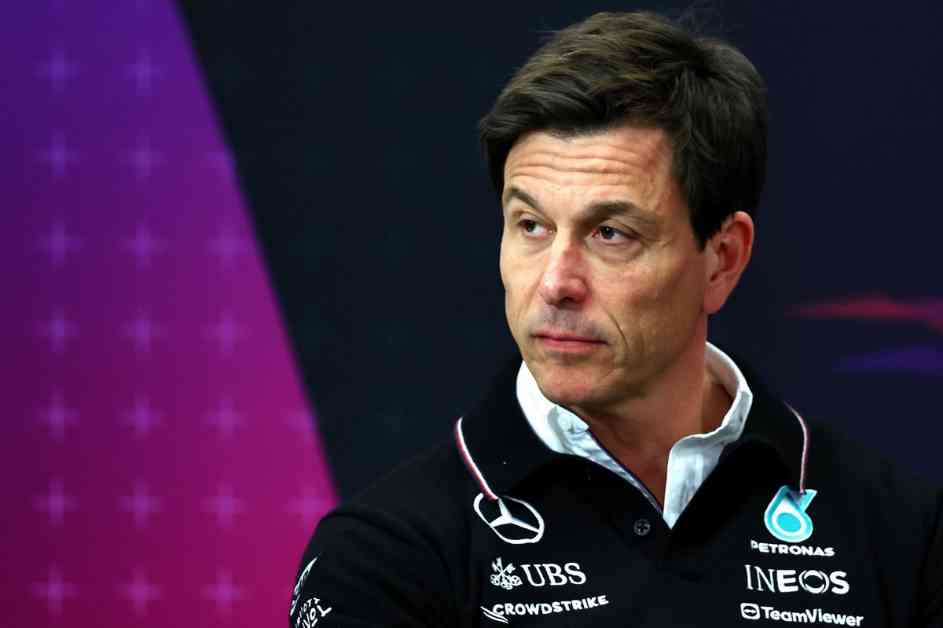Mercedes team principal Toto Wolff has called for a more civilized approach to the recent controversy surrounding swearing in Formula 1, particularly in light of the FIA’s decision to penalize Max Verstappen for using a swear word. During a press conference in Singapore, Verstappen had referred to his car as “f***ed,” leading to the FIA imposing a penalty equivalent to community service.
Verstappen’s reaction to the punishment was to limit his interactions during subsequent press conferences and instead engage with the media outside of these formal settings. Wolff shared his own experience of being summoned in front of the stewards for using inappropriate language in Las Vegas, emphasizing the need for greater nuance in addressing such situations.
He highlighted the importance of maintaining respect and avoiding disrespect towards others, especially considering that there are viewers at home watching. While acknowledging the prevalence of swearing in everyday language, Wolff emphasized the significance of context in determining the acceptability of such language. He recognized the intense emotions drivers experience during races but suggested that toning down the use of profanity could benefit everyone involved.
Christian Horner, Red Bull team boss, expressed his belief that the situation could have been handled differently to prevent any unnecessary backlash. He noted that while drivers like Verstappen are indeed role models, the distinction between language used in everyday life and in specific contexts like press conferences should be taken into account. Horner emphasized the need for relative reactions and understanding, especially in cases where English is not the driver’s native language.
The debate surrounding the use of language in Formula 1 extends beyond individual incidents like Verstappen’s swearing. It raises questions about the expectations placed on drivers, the influence they have as public figures, and the balance between authenticity and professionalism in their communication.
Public Perception and Role Model Responsibility
As public figures, Formula 1 drivers are often seen as role models, particularly by younger fans who look up to them for inspiration. The language they use, both on and off the track, can influence how they are perceived by the public and the values they represent. While some may argue that drivers should be allowed to express themselves freely, others emphasize the need for a certain level of decorum and respect in their communication.
The incident involving Verstappen’s swearing has sparked discussions about the impact of such language on the sport’s image and the message it sends to fans, sponsors, and other stakeholders. While some may view swearing as a natural part of competitive sports, others argue that there are more appropriate ways to convey frustration or emotion without resorting to profanity.
Cultural Differences and Language Challenges
Verstappen’s use of swear words in press conferences also highlights the challenges faced by drivers who may not speak English as their first language. Communication in a second language can be challenging, especially in high-pressure situations like press conferences where drivers are expected to articulate their thoughts clearly and concisely.
The cultural context in which swearing is perceived can vary greatly, with some cultures being more accepting of profanity in everyday language than others. This adds another layer of complexity to the debate surrounding language use in Formula 1 and the need for sensitivity to cultural differences and linguistic challenges faced by drivers from diverse backgrounds.
Respecting Individual Expression and Authenticity
While calls for a more civilized approach to language use in Formula 1 are valid, it is also important to consider the drivers’ need for self-expression and authenticity. Racing at the highest level of motorsport is a physically and mentally demanding pursuit, with drivers experiencing a wide range of emotions during races.
Allowing drivers to express their emotions, even if it includes the occasional swear word, can humanize them and make them more relatable to fans. Balancing the drivers’ authenticity with the expectations of professionalism and respect in their communication is crucial in maintaining the sport’s appeal and relevance to a diverse audience.
In conclusion, the controversy surrounding Max Verstappen’s swearing in Formula 1 has sparked important conversations about language use, cultural differences, and the responsibilities of drivers as public figures. While calls for a more civil approach are valid, it is essential to consider the drivers’ need for self-expression and authenticity in a high-pressure environment like Formula 1. Finding a balance between respecting individual expression and upholding professional standards is key to ensuring the sport’s continued success and relevance in the global sporting landscape.








